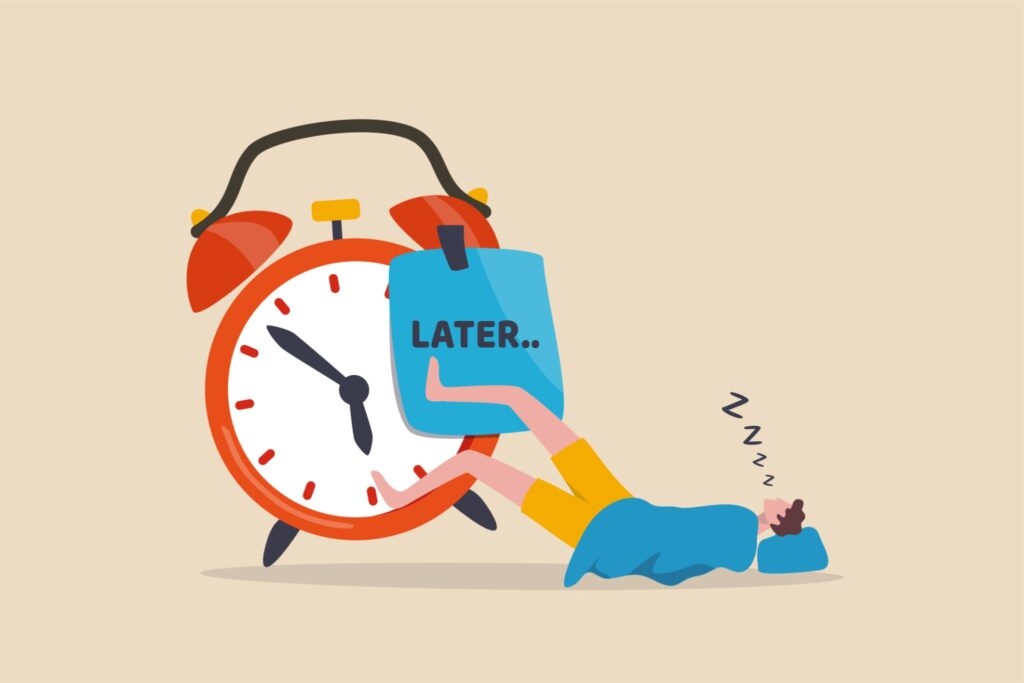The art of procrastination is something that most of us have perfected over the years. Whether it is putting off a work project, cleaning the house, or exercising, it seems that we always find an excuse to postpone the task at hand. However, the underlying psychology of procrastination goes much deeper than just laziness or lack of motivation. In fact, it is a complex psychological phenomenon that affects our mental health in ways that we may not even realize.
What is Procrastination?
Procrastination is defined as the act of delaying or postponing something that needs to be done. It is a behavior that is exhibited by individuals across all ages, genders, and cultures. In simple terms, it is the act of putting off a task until a later time, often at the expense of our own productivity, goals, and mental health.
The Psychology of Procrastination
There are several underlying psychological factors that contribute to procrastination. These include fear of failure, lack of motivation, anxiety, and perfectionism.

Fear of Failure
One of the most common reasons why people procrastinate is fear of failure. The fear of not meeting expectations, being judged or ridiculed by others, or simply not being good enough can be overwhelming for some individuals. As a result, they may put off tasks until the last minute or avoid them altogether, in order to avoid the risk of failure.
Lack of Motivation
Another psychological factor that contributes to procrastination is lack of motivation. This can stem from a variety of sources, including boredom, lack of interest in the task at hand, or feeling overwhelmed by the size of the task. When individuals lack motivation, they may struggle to find the energy and enthusiasm to get started on a task, and therefore put it off until a later time.
Anxiety
Anxiety is another psychological factor that can contribute to procrastination. When individuals feel anxious or stressed, they may find it difficult to focus on the task at hand. They may become overwhelmed by the pressure of the situation, and feel paralyzed by the fear of making mistakes. This can lead to procrastination, as individuals struggle to find a way to cope with their anxiety.
Perfectionism
Perfectionism is another psychological factor that can contribute to procrastination. When individuals hold themselves to high standards, they may become overly critical of their work, and feel that nothing they do is good enough. As a result, they may avoid starting a task, or procrastinate in order to spend more time perfecting their work.
The Relationship Between Procrastination and Mental Health
Procrastination can have a significant impact on our mental health, affecting our mood, self-esteem, and overall well-being. Here are some of the ways in which procrastination can impact mental health:
Increased Stress and Anxiety
Procrastination can lead to increased stress and anxiety, as individuals struggle to complete tasks on time or feel overwhelmed by the sheer number of tasks that need to be done. This can lead to feelings of anxiety, tension, and even panic, which can have a significant impact on our mental health.
Low Self-Esteem
Procrastination can also impact our self-esteem, as we begin to question our ability to complete tasks and meet deadlines. When we put off tasks, we may feel guilty, ashamed, or even worthless, which can lead to low self-esteem and feelings of inadequacy.
Decreased Productivity
Procrastination can also lead to decreased productivity, as we struggle to find the energy and motivation to complete tasks. This can lead to feelings of frustration and dissatisfaction, as we may feel that we are not accomplishing as much as we should be.
Increased Depression
Procrastination can also increase the risk of depression, as individuals may feel overwhelmed by the tasks that need to be done, and may struggle to manage time and increased load on mind.
Overcoming procrastination
To stop procrastinating, do the following:
- Set specific and realistic goals- by setting realistic goal will motivate you to achieve your task and you won’t leave the work in between. For example, we want to learn driving break the goal in small task and complete it.
- Assess your procrastination. First, identify cases in which you delay unnecessarily. Then, think about those situations to also figure out where and when you procrastinate Finally, figure out why you procrastinate based on the information you saw in this guide.
- Implement your plan. Make sure to reflect on your progress and refine your approach, primarily by figuring out which techniques work for you and how you can implement them most effectively.

The following are key anti-procrastination techniques you can use as part of your plan:
- Break tasks into small steps- this will help one to achieve task in easy an easy way.
- Give yourself permission to make mistakes -By accepting that your work won’t be perfect
- Make it easier to do things-By preparing everything you need in advance
- Set deadlines or make to do list- this will include discipline in your routine and tasks will be completed on time.
- Identify and address your fears- confront your fears and defeat them.
- Increase your motivation- by setting the goal or what you want to be after certain years will give you motivation to complete the task.
- Increase your energy- include proper nutrition in your diet and take small naps or breaks so that you can start with full energy.
- Improve your environment- place things in a proper order and minimise the things in your working place for less distractions.
- Use time-management techniques for task completion
- Start with your best or easy task – so that it gives a feeling of satisfaction and achievement.
- Develop self-efficacy (e.g., by reflecting on your successes).
- Develop self-compassion (e.g., by reminding yourself that everyone makes mistakes).
Remember that some efforts are better than no effort, we will be in a good position if we try, than from doing nothing at all. The more you delay more you will be stuck taking immediate actions should be ones policy. Wrong steps can be improved and we learn from our mistakes but nothing will happen if we don’t work.
If you feel overwhelmed, start by just identifying the smallest possible step you can take to make progress toward your goals, and then try to start with just that tiny step, while giving yourself permission to make mistakes during the attempt. Potentially, you can also make it easier for yourself to get started, for example by preparing your tools without yet trying to start working, and make it harder to procrastinate, for example by removing distractions from your environment.





